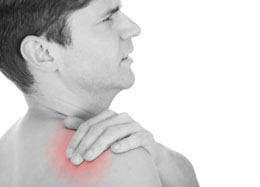A muscle strain is characterized by the tearing or rupturing of muscle fibers or tendons. This Buzzle write-up provides information on the causes of a strained shoulder muscle.

Located at the uppermost section of the arm and top section of the shoulder is the deltoid muscle, the largest muscle of the shoulder. The other muscles that help us move our shoulder and arm include the four rotator cuff muscles (Infraspinatus, Subscapularis, Supraspinatus, and the Teres major muscles), Tricep brachii, Pectoralis major, Pectoralis minor, Bicep brachii, and Latissimus dorsi. We use these muscles for performing a wide range of activities. If any of these muscles get stretched beyond the tolerable limits, it is bound to cause shoulder pain. In severe cases, the range of motion of the joint might become restricted. At times, the tendons that attach the muscles to their bony attachments could also get damaged. Shoulder muscles could get strained in the event of trauma or injury. Lifting heavy objects in a wrong manner can be a contributing factor. Chronic muscle strains could occur due to repetitive use injuries.
Contributing Factors
Rotator cuff tears are likely to occur if these four muscles are stretched beyond the normal limits. Infraspinatus muscle helps us raise and lower the arms, whereas subscapularis (large triangular muscle located near the humerus and collarbone) helps us rotate the humerus. The supraspinatus muscle (located at the top of the shoulder) helps us raise the arm away from the body, whereas the teres major muscle helps us rotate the upper arm. Rotator cuff muscles and tendons that attach them to the bone could develop a partial or full tear in case one lifts a very heavy object with a sudden jerking motion. These muscles could also develop a tear if one falls on an outstretched arm. Those who play sports such as baseball, tennis, rowing, and weightlifting are at a greater risk of muscle strains due to the twisting or pulling actions involved in these games. Also, these muscles could get strained, if the nature of one's work involves repetitive overhead activities. For instance, working on a computer with the keyboard too high or driving a car where the steering is too far off could also cause muscle fatigue.
Blunt force trauma to the shoulder can also cause the deltoid muscle to get strained. Other muscles such as the tricep brachii (muscle in the back of the upper arm that helps straighten the arm), pectoralis major (muscle that connects to the breastbone), pectoralis minor (muscle extending from the upper ribs up to the shoulder), bicep brachii (muscle that rotates the forearm and flexes the elbow), and latissimus dorsi (muscle of the back that helps rotate the arms and move them closer and away from the body) could also get strained due to strenuous physical activities.
Symptoms
The symptoms would vary, depending on the extent of damage. Strained shoulder muscles could give rise to the following symptoms:
➻ Pain
➻ Tenderness
➻ Inflammation
➻ Localized swelling
➻ Muscle weakness
➻ Bruising
➻ Stiffness
➻ Soreness
➻ Restricted range of motion
Treatment
RICE (Rest, Ice, Compression, and Elevation) technique is often recommended for muscle strains.
➻ The affected individual should take rest, and refrain from performing activities that can worsen the condition. Don't lift heavy objects, or participate in sports that involve lifting, throwing, or overhead activities.
➻ Application of ice packs can help alleviate the swelling.
➻ Wearing a a shoulder brace, harness, sling, or compression sleeve can help rest the muscles, thereby speeding up the healing process.
➻ While sleeping, prop your shoulder on a pillow to keep it elevated. This is to improve the blood flow and speed up the recovery process.
If the pain is severe, doctors might prescribe analgesics or non-steroidal anti-inflammatory drugs to alleviate pain and swelling. In some cases, where there's complete rupturing of the muscle fibers, doctors might recommend a surgery.
Disclaimer:
The information provided in this article is solely for educating the reader. It is not intended to be a substitute for the advice of a medical expert.


 Located at the uppermost section of the arm and top section of the shoulder is the deltoid muscle, the largest muscle of the shoulder. The other muscles that help us move our shoulder and arm include the four rotator cuff muscles (Infraspinatus, Subscapularis, Supraspinatus, and the Teres major muscles), Tricep brachii, Pectoralis major, Pectoralis minor, Bicep brachii, and Latissimus dorsi. We use these muscles for performing a wide range of activities. If any of these muscles get stretched beyond the tolerable limits, it is bound to cause shoulder pain. In severe cases, the range of motion of the joint might become restricted. At times, the tendons that attach the muscles to their bony attachments could also get damaged. Shoulder muscles could get strained in the event of trauma or injury. Lifting heavy objects in a wrong manner can be a contributing factor. Chronic muscle strains could occur due to repetitive use injuries.
Located at the uppermost section of the arm and top section of the shoulder is the deltoid muscle, the largest muscle of the shoulder. The other muscles that help us move our shoulder and arm include the four rotator cuff muscles (Infraspinatus, Subscapularis, Supraspinatus, and the Teres major muscles), Tricep brachii, Pectoralis major, Pectoralis minor, Bicep brachii, and Latissimus dorsi. We use these muscles for performing a wide range of activities. If any of these muscles get stretched beyond the tolerable limits, it is bound to cause shoulder pain. In severe cases, the range of motion of the joint might become restricted. At times, the tendons that attach the muscles to their bony attachments could also get damaged. Shoulder muscles could get strained in the event of trauma or injury. Lifting heavy objects in a wrong manner can be a contributing factor. Chronic muscle strains could occur due to repetitive use injuries.